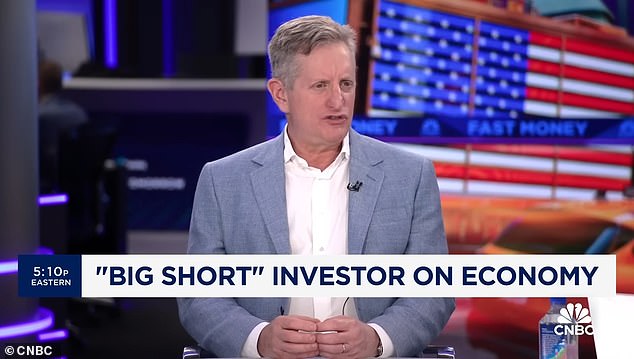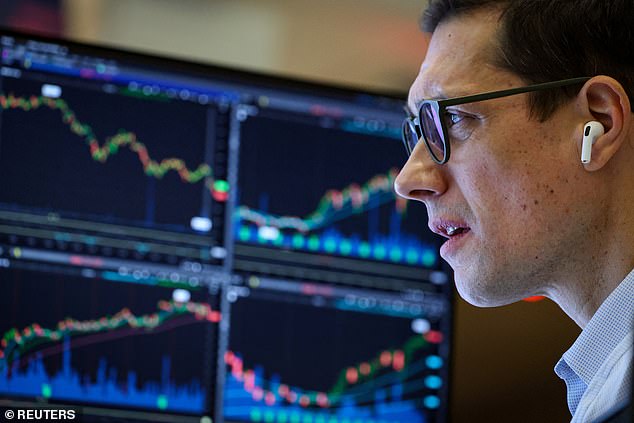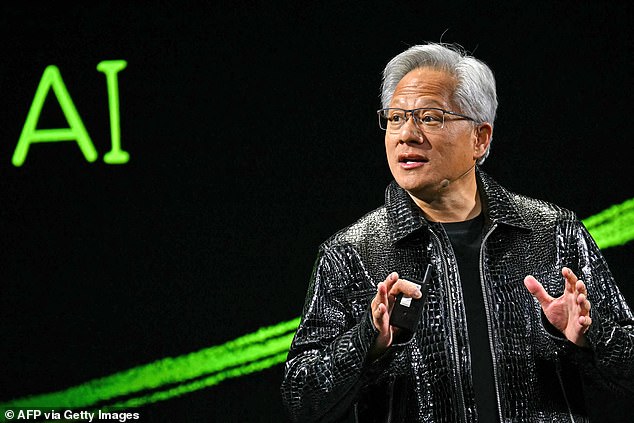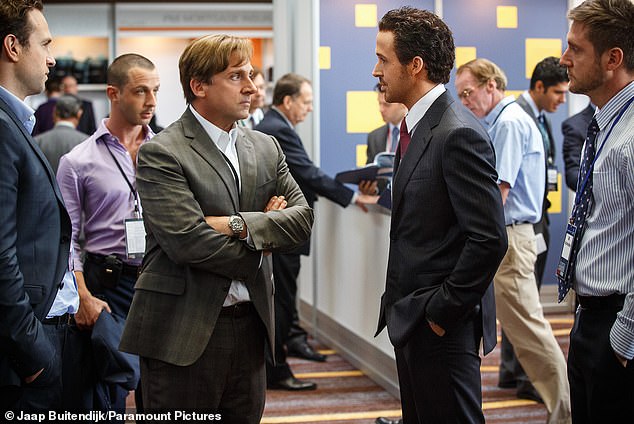Steve Eisman — the investor who famously predicted the 2008 financial crash — has a new warning for Wall Street.
In an exclusive interview with the Daily Mail, Eisman said he is ‘concerned’ by the stratospheric rise of big tech and artificial intelligence stocks, even while the rest of the market remains flat.
The 63-year-old said the US is seeing what is known as a ‘K-shaped economy’ — so called because, like the letter K, a few industries shoot upward while the rest fall away.
Indeed, the contrast is sharp. Everything the US economy produced in 2024, known as Gross Domestic Product or GDP, totaled $29.18 trillion. It is estimated to grow 1.8 percent this year, by roughly $530 billion.
But Eisman noted that the likes of Meta, Google, Amazon and OpenAI alone are pouring more than $400 billion into AI. Their spending, explained Eisman, accounts for most of that growth.
‘The AI stuff is doing very well, that’s the good part of the ‘K,’ and everything else is basically flat,’ he said. ‘That’s something to be concerned about — that the only thing that is growing is AI-related.’

Steve Eisman has warned that the US is seeing a ‘K-shaped’ economy
The staggering boom in AI companies such as ChatGPT-creator OpenAI and chip maker Nvidia, as well as investments by Magnificent 7 tech firms in the tech, has led economists to speculate whether AI is heading into bubble territory.
Earlier this year, Nvidia became the first public company to top $4 trillion in value. Microsoft also briefly crossed the $4 trillion value mark, making it only the second company ever to reach the staggering milestone.
Many have compared today’s market to the dot-com bubble, when internet-based companies saw a huge boom in the late 1990s before crashing in the early 2000s.
Some are predicting that the same thing will happen with the overheated AI trade, which would have devastating consequences for the US economy.
But Eisman is not so sure.
‘There’s a big difference between now and then,’ he said.
‘In the 1990s, I was the sell side analyst at a firm called Oppenheimer. I was covering financial services, and across the hall from me was a very young Henry Blodget, who was the Oppenheimer internet analyst.’
Blodget was one of Wall Street’s best-known internet analysts before the crash and its recriminations, which resulted in him being banned from the financial industry. He went on to co-found Business Insider.

Eisman said he is ‘concerned’ by the stratospheric rise of big tech and artificial intelligence stocks

Earlier this year, Nvidia became the first public company to top $4 trillion in value (Pictured: Nvidia CEO Jensen Huang)
‘Blodget was young and gung ho, and every day he would get on the sales floor and he’d say two things. He’d say that the internet’s going to conquer the world, and that dynastic levels of wealth are going to be created.
He was’ 100,000 times correct’ on his two predictions, said Eisman. But first, there was a tech recession.
‘Back then, most of the money was being spent by very young companies, many of whom had no revenue. They just had raised a ton of money by going public.
‘They overspent and the returns weren’t there, and many of them went bankrupt. And then those that survived eventually thrived.’
But this time around, Eisman said, the $400 billion is being spent by the world’s largest companies and it’s being spent out of their cash flow. They are not borrowing it, as upstart internet companies had decades ago.
‘In that sense it’s healthy,’ said Eisman, host of the podcast The Real Eisman Playbook.
However, he warned that it is very early days in the world of AI, and no one knows what the returns are going to be.
‘You could say whatever you want at this point. I don’t know how it’s going to turn out, but right now it’s an absolute feeding frenzy.’
Eisman became a household name after the 2008 financial crisis.

Author Michael Lewis wrote a book about Eisman and others, titled The Big Short. Actor Steve Carell (above, left-center) played Eisman in the 2015 film of the same name
He raised the alarm about the precarious state of the US housing market in 2007, and his hedge fund FrontPoint Partners took a bet against subprime mortgages.
Then all hell broke loose. The bottom fell of the housing market, triggering a global financial crisis – and Eisman’s firm made an estimated $1 billion.
Author Michael Lewis wrote a book about Eisman and others, titled ‘The Big Short,’ and actor Steve Carell played him in the 2015 film of the same name.
‘It’s not like 2007 where you got to look at securitization data, and you saw deterioration in credit quality,’ Eisman said.
Now, we have some of the largest companies in the world spending a fortune on AI with the promise that it is going to be amazing, he said.
‘Maybe it’s going to be great. I don’t know.’
